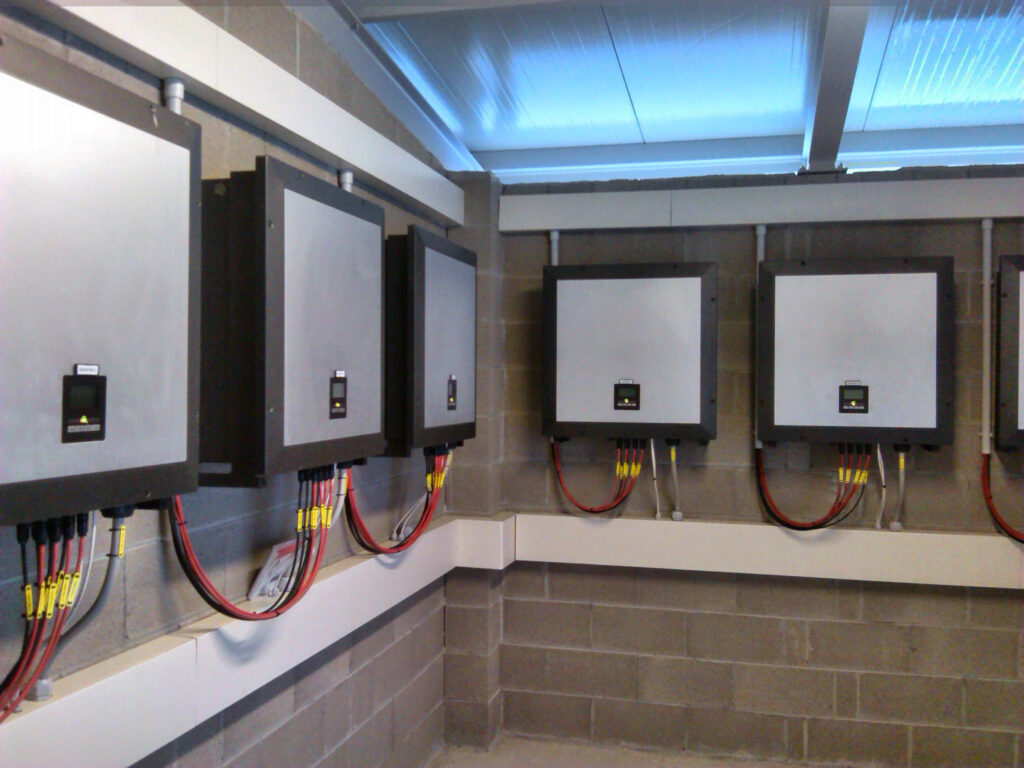High frequency inverters find application across various industries and sectors due to their compact size, efficiency, rapid response, and precise control capabilities. Here are some common application ranges of high frequency inverters.
- Uninterruptible Power Supplies (UPS): High frequency inverters are widely used in UPS systems to provide backup power during mains power failures. Their compact size and fast response make them ideal for critical applications such as data centers, telecommunications facilities, and medical equipment.
- Renewable Energy Systems: High frequency inverters are used in solar photovoltaic (PV) systems and wind turbines to convert DC power generated from solar panels or wind generators into AC power for grid connection or standalone use. Their efficiency and variable frequency operation make them suitable for maximizing energy harvest from renewable sources.
- Electric Vehicle (EV) Powertrains: High frequency inverters are essential components in electric vehicle powertrains, where they control the speed and torque of the electric motor by converting DC power from the battery into variable-frequency AC power. Their compact size, rapid response, and efficient operation contribute to the performance and range of electric vehicles.
- Induction Heating: High frequency inverters are used in induction heating applications for processes such as metal melting, forging, brazing, and heat treatment. Their ability to provide precise control of frequency and power output enables efficient and uniform heating of metal components.
- Medical Equipment: High frequency inverters are employed in various medical devices and equipment, including MRI machines, X-ray generators, laser systems, and electrosurgical units. Their compact size, rapid response, and reliable operation are critical for maintaining patient safety and equipment performance.
- HVAC Systems: High frequency inverters are utilized in variable frequency drives (VFDs) for controlling the speed of HVAC (heating, ventilation, and air conditioning) system motors. By adjusting the frequency and voltage supplied to the motors, high frequency inverters enable energy-efficient operation and precise control of airflow and temperature.
- Industrial Automation: High frequency inverters are integrated into automation systems for controlling the speed and position of motors in various industrial processes, including conveyor systems, pumps, fans, and compressors. Their fast response and advanced control features enhance productivity and efficiency in manufacturing environments.
- Telecommunications: High frequency inverters are used in backup power systems for telecommunications infrastructure, such as cell towers and communication hubs. Their compact size and reliable performance ensure continuous operation during power outages, ensuring uninterrupted communication services.
- Military and Aerospace: High frequency inverters are employed in military and aerospace applications for powering onboard electronics, communication systems, radar equipment, and navigation systems. Their rugged design, compactness, and reliability are crucial for mission-critical operations in harsh environments.
- Residential and Small Commercial Applications: High frequency inverters are also utilized in smaller-scale applications such as residential solar PV systems, portable power generators, and small-scale industrial equipment. Their versatility and efficiency make them suitable for a wide range of distributed energy generation and power conversion needs.


